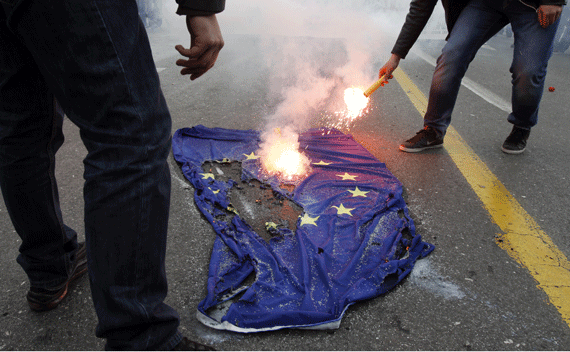Guest Post: The Crisis in Europe

As fears mount that the debt crisis could spread to Italy and Spain, markets gyrate and European officials struggle to calm nerves. My colleague, Charles Kupchan, the CFR’s Whitney Shepardson Fellow and a professor of international affairs at Georgetown University, offers his assessment.
The world is watching Europe’s economic travails almost as closely as it watching America’s. Although the focus is on debts and markets, it’s the political mess that is most troubling. In Europe, as in the United States, political dysfunction and the difficulties of governance are the most worrisome story.
The European Union (EU) is the world’s standard bearer when it comes to projects of regional integration. It has built a single market and introduced a single currency, opened national boundaries, and forged peace between former rivals. The success of the EU makes it a model for the Association of Southeast Asian Nations, the Gulf Cooperation Council, Mercosur, and just about every other effort at regional integration.
Equally important, the EU remains America’s main partner. Teamwork between the United States and Europe is essential to tackling most international challenges, including stabilizing Afghanistan, responding to the Arab Spring, righting the global economy, and promoting global health.
The ability of the EU to pull out of its tailspin depends on two related, but separate, issues. One is controlling the debt crisis and stabilizing the eurozone. The other is reversing the trend toward political fragmentation and renationalization.
Europe’s debt crisis may be dominating headlines, but the EU’s political fracturing is the real peril. On the economic front, Europe’s leading members – even if belatedly – are likely to take the necessary steps to stabilize the eurozone. The stakes are simply too high for France and Germany to let the euro fail. The likely outcome in the long run is greater convergence on fiscal policy – which the introduction of the euro should have entailed to begin with – and debt instruments backed by the collective eurozone. Deeper integration on fiscal policy will ultimately strengthen the EU – even if it means the consolidation of a multi-speed Europe and convinces members like Britain, which is determined to maintain its monetary and fiscal autonomy, to keep their distance from the common currency.
This deeper economic integration would parallel ongoing efforts to move toward more collective decision making on matters of foreign policy. The Lisbon Treaty endows the EU with the institutions needed to project a more unified voice on the geopolitical stage. Although Catherine Ashton, the High Representative for Foreign Affairs and Security Policy, and the External Action Service – the EU’s new diplomatic corps – are off to a slow start, the structures are in place. The challenge is breathing political life and legitimacy into these institutions.
Connecting the EU’s institutions with Europe’s politics is the EU’s greatest challenge, as my colleague Kathleen McNamara wrote in September. The core of the problem is that the EU is becoming increasingly divorced from the European street. Since its inception, the project of European integration has primarily been an elite effort. Publics have been either disengaged or passively supportive.
But no longer; the EU has been politicized. In beer gardens in Munich, cafés in Paris, and tavernas in Athens the electorate is finally animated by the project of European integration. The EU, however, is the object of scorn, not affection. The rejection of the Constitutional Treaty, enlargement, immigration and the desirability of open borders, the financial downturn and the costs and benefits of a shared economic destiny – these developments have provoked considerable public ire. The EU is no longer a distant and elitist – even if benign – undertaking; many Europeans now see the union as undermining their ability to control their destiny.
To be sure, the surging fortunes of the populist right are a cause as well as a symptom of the growing strength of anti-immigrant and anti-EU sentiment. But even in Germany, where the far right remains a marginal political force, the main parties are embracing elements of the populist agenda – even if only in milder form. Angela Merkel’s critiques of multiculturalism and her reluctance to bail out Germany’s ailing neighbors speak to a new and worrying strain in mainstream German politics.
Merkel, as most other leaders in Europe, is following public opinion, not leading it. And given Germany’s outsized influence on the EU, it shakes the foundations of Europe when the Berlin government seems adrift and bereft of its traditional attachment to the European project. It is troubling, to say the least, that neither in Germany, nor elsewhere in Europe, are there signs that leaders are prepared to lead rather than be pushed along by public discontent. Without a decisive stopping force, populism is likely to mount, only making it more difficult for the EU to regain its political footing among electorates.
Europe’s leaders are justifiably in crisis mode. But they are focusing exclusively on the debt crisis and the urgency of stabilizing the euro-zone. They should be paying at least as much attention to the growing disaffection with the EU on the European street. Rebuilding popular confidence in the legitimacy and efficacy of the European project is at least as important as saving the euro.
 Online Store
Online Store